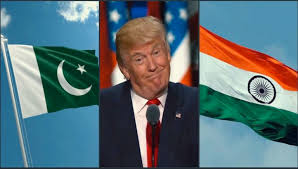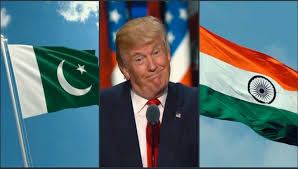
In remarks that are likely to worsen ties between the two nuclear-armed rivals, President Donald Trump stressed the need for stronger ties with India as he blasted Pakistan for being a terrorist hotbed on Monday.
While warning Pakistan of consequences if the government didn't crack down on sweeping fundamentalism, Trump accused Islamabad of harboring militants during a speech focused on U.S. military engagement in Afghanistan.
"The U.S. can no longer be silent about Pakistan's safe havens for terrorist organizations, the Taliban and others, that pose a threat to the region and beyond ... No partnership can survive a country's harboring of militants," he said.
The leader brought India into the equation a few sentences later.
"The U.S. will further develop its strategic partnership with India," Trump said, referring to the realm of counter-terrorism. He added that in areas of economic assistance and development, Washington wants New Delhi to help more with Afghanistan.
According to strategists, siding with India immediately after criticizing Pakistan is a risky gambit even while previous U.S. administrations have long echoed similar views.
Jan Zalewski, a senior South Asia analyst at Verisk Maplecroft said that Trump's comments are polarizing a deeply divided region. He explained that the U.S. praising India while chiding Pakistan isn't likely to go down well because Islamabad views New Delhi as a key national security threat.
the Islamic State, Al-Qaida in the Indian Subcontinent, Lashkar e-Tayyiba and Jaish-e-Mohammad are among the international and regional terror groups that present a deep threat to both the South Asian giants, who are historical arch-enemies.
According to recent figures by the U.S. State Department, compared to India's 927 incidents and Afghanistan's 1,340 figure, Pakistan witnessed 734 terrorist attacks in 2016.
"The fact that Trump is taking sides could hurt counter-terror initiatives between India and Pakistan," said Rohan Gunaratna, head of the International Center for Political Violence and Terrorism Research at Singapore's Nanyang Technological University.
"He shouldn't be playing favorites. The ideal U.S. strategy should be uniting India and Pakistan because both these countries are victims of regional terror groups," he added.
Territorial clashes, particularly concerning the disputed region of Kashmir, emerge as regular obstacles even though New Delhi and Islamabad have attempted to strengthen joint counter terrorism operations in the past.
The Tehrik-e Taliban Pakistan, the Afghan Taliban and its affiliated Haqqani Network are among the domestic groups executing attacks against Pakistan's civilian and government. Meanwhile, from armed Christian separatists in Assam to Maoist rebels are the homegrown threats for India.
Alexander Capri, visiting senior fellow at the National University of Singapore warned that a stronger stance against Islamabad could be taken by hardliners in Indian Prime Minister Narendra Modi’s administration due to Trump's comments.
"Look at what happened with Saudi Arabia, the Gulf states and Qatar after Trump's first trip overseas, where he emboldened Sunni Gulf countries to take action against Iran and its Shia stakeholders." The same kind of dynamic could unfold with India and Pakistan, Capri continued.
In fact, Trump's remarks could even increase terrorist activities.
"Many terrorist groups in Pakistan maintain an overtly anti-Indian agenda, [so] a significantly increased Indian role in Afghanistan would likely increase terrorism risks against Indian targets in Afghanistan and in India itself," warned Zalewski.
(Source:www.cnbc.com)
While warning Pakistan of consequences if the government didn't crack down on sweeping fundamentalism, Trump accused Islamabad of harboring militants during a speech focused on U.S. military engagement in Afghanistan.
"The U.S. can no longer be silent about Pakistan's safe havens for terrorist organizations, the Taliban and others, that pose a threat to the region and beyond ... No partnership can survive a country's harboring of militants," he said.
The leader brought India into the equation a few sentences later.
"The U.S. will further develop its strategic partnership with India," Trump said, referring to the realm of counter-terrorism. He added that in areas of economic assistance and development, Washington wants New Delhi to help more with Afghanistan.
According to strategists, siding with India immediately after criticizing Pakistan is a risky gambit even while previous U.S. administrations have long echoed similar views.
Jan Zalewski, a senior South Asia analyst at Verisk Maplecroft said that Trump's comments are polarizing a deeply divided region. He explained that the U.S. praising India while chiding Pakistan isn't likely to go down well because Islamabad views New Delhi as a key national security threat.
the Islamic State, Al-Qaida in the Indian Subcontinent, Lashkar e-Tayyiba and Jaish-e-Mohammad are among the international and regional terror groups that present a deep threat to both the South Asian giants, who are historical arch-enemies.
According to recent figures by the U.S. State Department, compared to India's 927 incidents and Afghanistan's 1,340 figure, Pakistan witnessed 734 terrorist attacks in 2016.
"The fact that Trump is taking sides could hurt counter-terror initiatives between India and Pakistan," said Rohan Gunaratna, head of the International Center for Political Violence and Terrorism Research at Singapore's Nanyang Technological University.
"He shouldn't be playing favorites. The ideal U.S. strategy should be uniting India and Pakistan because both these countries are victims of regional terror groups," he added.
Territorial clashes, particularly concerning the disputed region of Kashmir, emerge as regular obstacles even though New Delhi and Islamabad have attempted to strengthen joint counter terrorism operations in the past.
The Tehrik-e Taliban Pakistan, the Afghan Taliban and its affiliated Haqqani Network are among the domestic groups executing attacks against Pakistan's civilian and government. Meanwhile, from armed Christian separatists in Assam to Maoist rebels are the homegrown threats for India.
Alexander Capri, visiting senior fellow at the National University of Singapore warned that a stronger stance against Islamabad could be taken by hardliners in Indian Prime Minister Narendra Modi’s administration due to Trump's comments.
"Look at what happened with Saudi Arabia, the Gulf states and Qatar after Trump's first trip overseas, where he emboldened Sunni Gulf countries to take action against Iran and its Shia stakeholders." The same kind of dynamic could unfold with India and Pakistan, Capri continued.
In fact, Trump's remarks could even increase terrorist activities.
"Many terrorist groups in Pakistan maintain an overtly anti-Indian agenda, [so] a significantly increased Indian role in Afghanistan would likely increase terrorism risks against Indian targets in Afghanistan and in India itself," warned Zalewski.
(Source:www.cnbc.com)





